Sweeping in Portugal

Sweeping in Portugal |
 |
The Cleaning of Évora,
by Ranger Kidwell-Ross
|
Because of their cobblestone construction, portions of the streets are always in a state of repair. When the bricks sink, come loose, etc., the 'bad' stones are removed and sand is packed in the hole until repairs can be made. Sweepers are not allowed in the area until the new stones are fitted into place. The photo animation shows an example of an area waiting for repairs, and another where the repair of the street was in progress. |
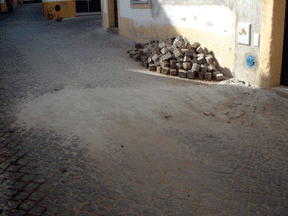 |
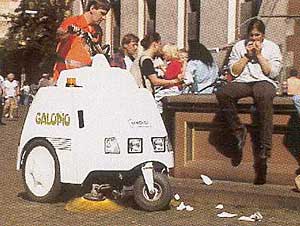 |
The city also owns two, small, Portuguese-built sweepers that have extendable suction hoses. They're powered by 5-hp Honda engines, and appear to be much like the Madvac machines most readers have seen operate in the U.S. They're used to clean areas the Piquersas can't reach, as well as for emptying the wheelbarrows of the manual sweeping team. Additionally, they owned a 3-wheel sweeper, made by Galapao, that operated by a broom-and-conveyor system. However, Cordiero said, this machine was seldom in use because it "is filled with moving parts that keep it broken down much of the time." |
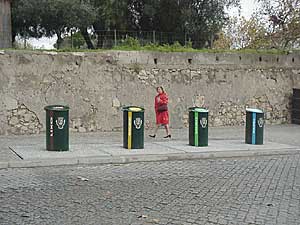
Because of Évora's heavy tourism traffic in its historic areas, garbage is removed seven days per week throughout that part of the city. As part of the city's commitment to cleanliness, the rest of the town has garbage service five times a week. The majority of the city's garbage containers are underground, with an above-ground tube for depositing garbage bags, etc. The garbage trucks lift the 3-cubic-meter 'vault' of garbage out, then empty the contents, much like is done with a standard roll-off container. The underground system allows for selective collection, since the truck operator can look inside to see how full it is before deciding whether or not it needs emptying. All sweepings, whether from the hand-sweeping crew or the machine sweepers, are mixed in with the city's garbage prior to disposal.
Although tourist traffic was heavy when I was there, most of Évora's streets were very clean and the garbage cans weren't filled to overflowing, as they'd been in some of the other tourist cities I'd seen. A few of the small side streets didn't appear to be getting the same level of cleaning attention as the more heavily traveled main plazas. However, that could simply have been due to the length of time it had been since that area's worker had been there to clean the areas I happened to see.
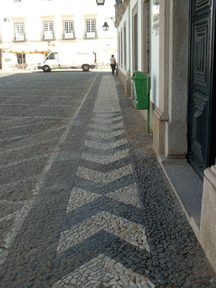
I did spot a few places in the city in need of some attention. One was a small, grassy, picnic-type area that was littered with paper and other small debris. Another was a fountain that wasn't in operation and, as a result, was filled with mosquito larvae. As it turned out, neither area was maintained by the street cleaning department. These were, rather, the responsibility of another agency in the city. Since the cleaning department has workers in the vicinity every day, perhaps a change of responsibility is something the city might consider.
Évora was one of the most unique cities I've ever seen, a city that stands out even in Portugal, a country filled with historic and unusual towns. Because of its history, many of Évora's side streets were especially narrow. And, since the town is built on a hill, as were most all castle fortresses, some of the streets were quite steep, as well.
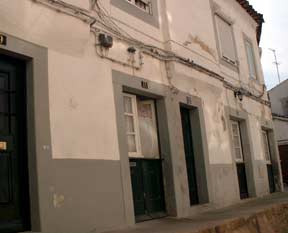
Due to the historical nature of Évora's building structures, it's been difficult for the city's agencies to keep up to date with the requirements of changing times. For example, here's a photo showing what was needed in order to bring Évora into the 'electrical age.' Apparently, the only way to get electricity from house to house was to run the wires along the outside of the buildings. When structures are made from stone, it's much more difficult to add needed electrical service to current structures.
A similar challenge exists for the city's street department. Although committed to keeping the historical look and feel of bygone times -- which means re-building roads with bricks/cobblestones and sand -- the department still has to do its best to keep the pavement clean, given the demands of an extremely heavy tourist load. To this visitor, it was clear the street department is performing the effective balancing act of retaining the city's history while maintaining a reputation for 21st century cleanliness. If the city always looks the way it did when I visited, Évora's tourism trade will continue to flourish.
While at Évora, I viewed many historical buildings and ruins, as well as some very inspiring architecture and artwork. All of it was similar to what I'd seen in Spain and other areas of Portugal, with one quite notable exception. Sao Francisco, one of the historic churches in Évora, contains a room with 'wallpaper' like none I'd ever seen. Although it has nothing to do with sweeping, you're welcome to take a look at this short 'bone-us' story, which is one of the many written during this European visit.
Thanks again to Évora's Manuel Cordiero for his willingness to be interviewed even through the language barrier. Although the city has a fine website, unfortunately it is in Portuguese. Manuel's best language is also Portuguese, however he is available via email sent to: cmevora.mcordeiro@mail.evora.net.
This story was one written during our editor's trip to Europe in 2003 to investigate how sweeping was done on that continent. While he was there, Ranger wrote an online journal for the sweeping industry. You may still view this online journal, which won a Grand National APEX Award for Online Journalism in 2004, in our archives.
© 2005 - 2021 World Sweeper
|
Countries Contents
|